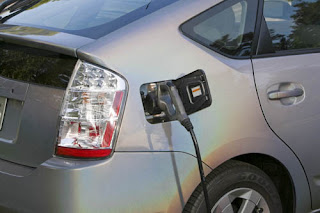Michigan Public Service Commission to Study PHEVs and the Power Grid
 Today, the Michigan Public Service Commission announced that it would initiate a study on the potential impact of plug-in hybrid-electric vehicles (PHEVs) and the power grid.
Today, the Michigan Public Service Commission announced that it would initiate a study on the potential impact of plug-in hybrid-electric vehicles (PHEVs) and the power grid.
PHEVs have been touted for the past year or so as a possible solution to high gasoline prices as well as climate-altering carbon emissions. Although there are not yet any mass-produced PHEVs available, there are likely to be several in the next few years, including the Saturn Vue Green Line, Chevrolet Volt, and a future Toyota Prius. PHEVs work similarly to “regular” hybrid vehicles, but have an up-sized battery system that allows more energy to be stored on board. Rather than charging the batteries solely with the internal combustion engine, they can be plugged into a standard 110-volt or 220-volt household outlet overnight, and driven several miles on battery power alone. Should the Chevy Volt achieve its development objectives, it will travel 40 miles on battery power alone, potentially relieving its owner of the burden of filling the gas tank often, if ever.
The goal of the MPSC is to use actual vehicles when available to analyze how PHEVs affect utility and regional electricity systems; basically, how much power would be taken from Michigan’s power grid if PHEVs reach production in significant quantities. A secondary objective is to study whether the PHEVs could return power to the grid when not being driven. Such a feature could be helpful during peak periods of the day when demand is highest; the power would then be returned to the vehicles at night when demand is much lower (and sometimes rates are also lower).
The MPSC has invited the state’s utility companies, GM, Ford, Chrysler, the public, and consumer advocacy groups to participate in the program. The agency is due to issue its first report just over a year from today, by June 30, 2009. We’ll check back on this issue by then, as it’s becoming an annual Full Metal Autos tradition.
As much as I love the torque of a big V8 underfoot, I also am probably too afraid of higher gas prices to ever actually buy something with a V8 under the hood. There is a huge appeal to me in the idea of rarely, if ever, needing to add gasoline to my commuter vehicle. Perhaps I could buy the big V8 for a weekend car, and a PHEV for my daily driver. The PHEV would certainly provide a nice carbon offset to the V8-powered vehicle.




